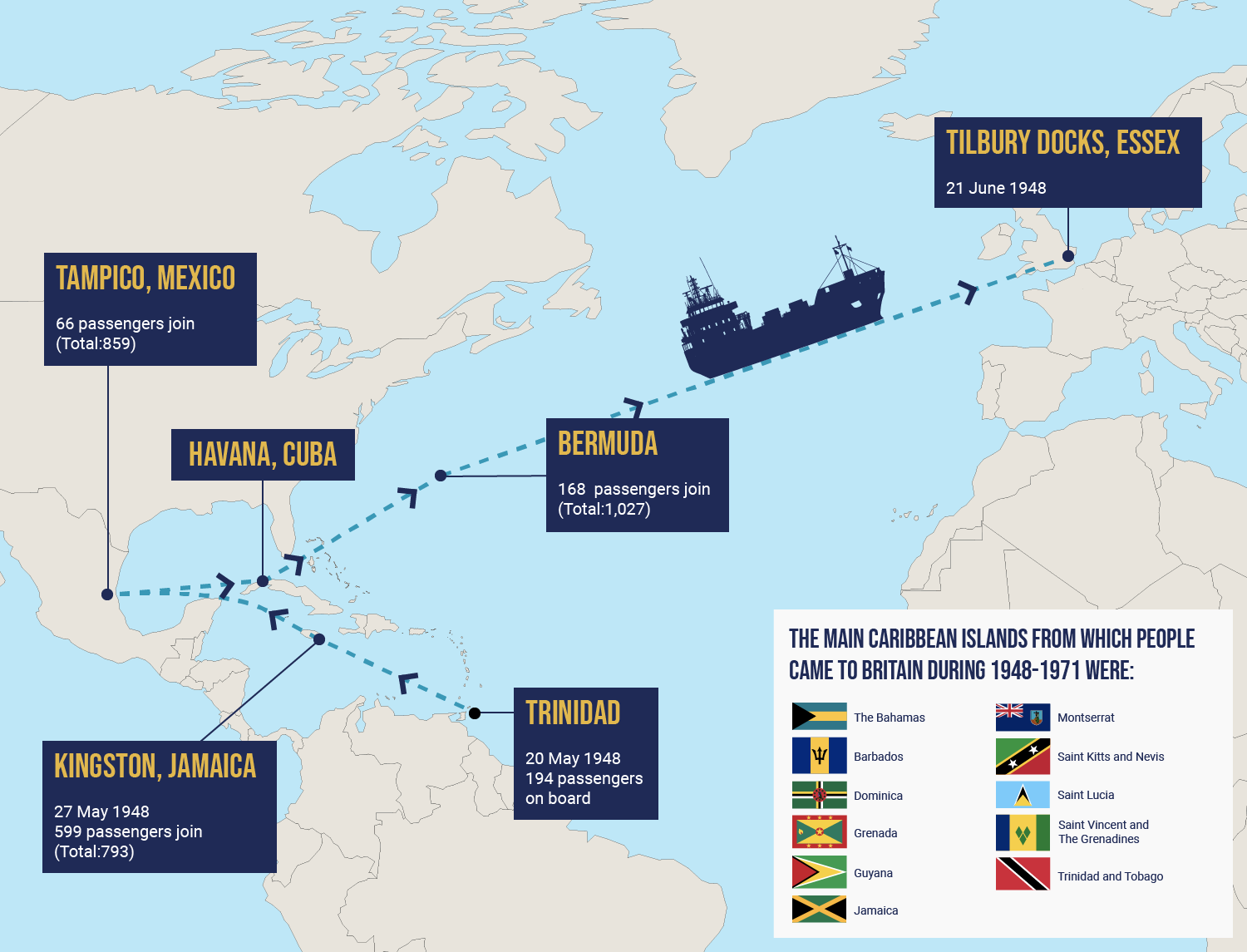Who are the Windrush Generation?
Thousands of men, women and children moved from the Caribbean to the UK in the 1940s, 50s, 60s and 70s. These individuals are known as the Windrush Generation – named after one of the ships that sailed from the Caribbean to England in 1948, the MV Empire Windrush.
The Windrush Generation came to Britain with a vast range of skills
The Windrush Generation helped make Britain what it is today. They worked in a range of areas, helping to rebuild the country. The most common sectors in which people from the Caribbean – both men and women – found jobs in towns and cities were in construction, public transport, factories and manufacturing. Many Caribbean women found employment as NHS nurses and nursing aides in hospitals across the country.
Today there are about one million people of Caribbean descent living in the UK.

Caribbean arrivals in Waterloo station. Photographs taken by Howard Grey in 1962.
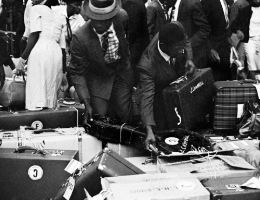
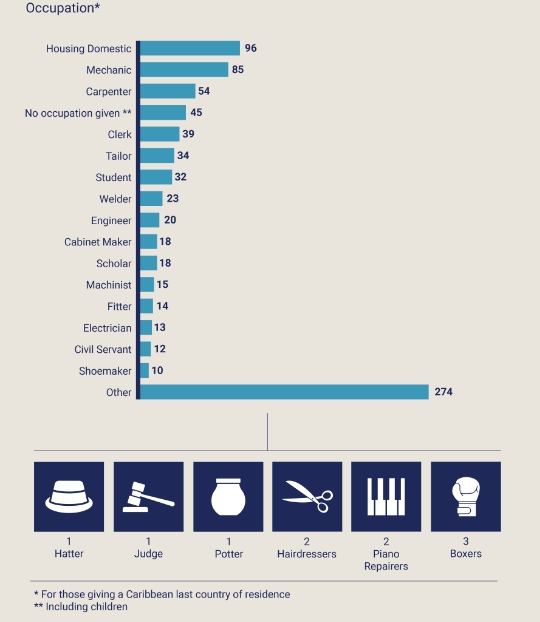
Facing Discrimination
Not everyone was happy about Caribbean people settling in the UK. Many of them faced discrimination due to the colour of their skin.
Many black people were treated unfairly and were paid less than their white co-workers. Some also struggled to rent accommodation. This meant that many Caribbean arrivals were forced to live in run-down areas and live with very little money.
Some individuals also faced serious violence and in certain areas, black people were attacked and had their homes vandalised. Despite this discrimination, the Windrush Generation continued to work hard to help Britain, which they were told was the Motherland.
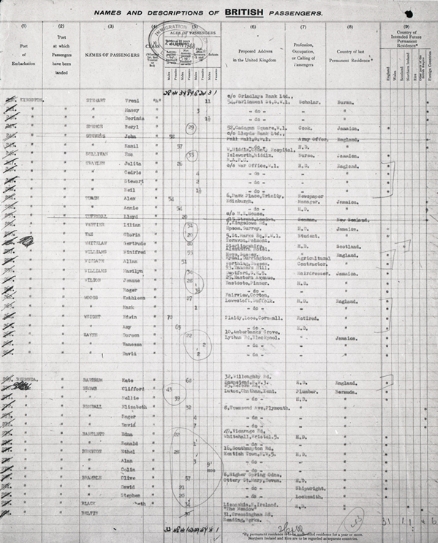
A page from the Empire Windrush passengers list. This provides an insight into the professions of those on board
“But life still remained a struggle. Every day was a battle and whenever I left the safety, comfort and security of my loving home, I knew I would have to face insults and abuse, from adults and children alike, as I walked the streets. When Marmie sent me shopping I knew the person behind the counter would ignore me, as though I was invisible and serve customers behind me in the queue. There was no question of going home without the shopping because my mum would say ‘Go back to the shop until they serve you’. That taught me resilience, persistence and determination.”
Baroness Floella Benjamin shares her experience of coming to England as a child. She is seen here with her family sitting bottom right.

Life for the Windrush Generation Today
The Windrush Generation, despite facing challenges, continued to succeed. Not only did they work in the NHS, transport and manufacturing industries, they also made the UK a more diverse and interesting place. Through starting businesses, building new communities and achieving success in politics, television, film, music and sports, the Windrush Generation changed British life forever.
Many of the people who came to the UK as children are now grandparents themselves. After years of living in the UK, people from the Windrush Generation started to face problems again, in what we now know as the Windrush Scandal, which began to emerge as a national issue in late 2017. Members of the Windrush Generation were told they were not British citizens after all because they did not possess the correct paperwork, and might be forced to go back to the Caribbean. After living and working in the UK for decades, this was upsetting and unexpected as they had worked so hard to help the UK. Eventually the Government apologised and promised that it would help anyone who was affected by setting up the Windrush Compensation Scheme.
As part of this promise, the Government also wanted to make sure that it was properly celebrating the Windrush Generation for the all the contributions they had made to Britain. A National Windrush Day was created, to be held on 22 June each year – the date the Empire Windrush landed at Tilbury Docks, Essex.

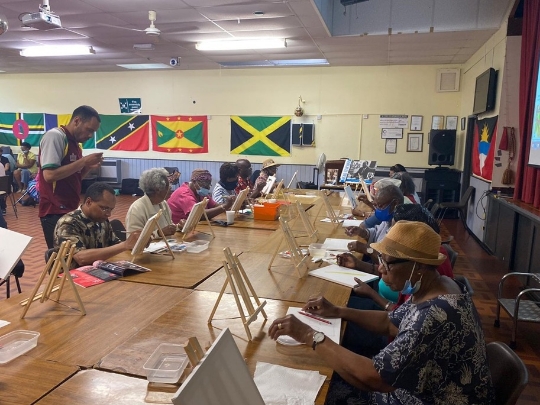
YOU CALLED ………..AND WE CAME.
You called…and we came.
In ships bigger than anything we had seen,
dwarfing our islands and covering them
in the shadows of smoke and noise.
Crowded, excited voices filled the air,
traveling to the ‘motherland’
– over weeks, over oceans that threatened to engulf us.
Driven by a wish, a call to save, to rebuild
and support efforts to establish ‘health for all’
in the aftermath of war.
You called….and we came.
Women and men of position in our homelands;
nurses with a pride in the excellence of our care.
With experience of management, organisation
and a sense of duty.
We appeared.
Smiling and eager to work on the wards, communities and clinics
of this England.
You called….and we came.
Our big hearts, skilful hands and quick minds
encased in our skins – of a darker hue.
Which had shimmered and glowed
in our sunnier climes.
But now signified our difference
– our un-belonging.
Matrons became assistants
Nurses became like chambermaids.
All the while striving to fulfil our promise
– to succour, to serve, to care.
You called….and we came.
The blue of the sister’s uniform
– seemed as far away from us as the moon.
Unreachable by our dark hands in this cold land.
But we were made of sterner stuff.
The hot sun, which once beat down on our ancestors,
when they too left their lands,
Shone within us.
Forging our hearts and minds
with the resistance of Ebony.
You called….and we came.
Rising like the Phoenix ,
from the heat of rejection.
We cared, we worked and we organised.
Until the quickness of our brains
and the excellence of our care
made it hard for you to contain us.
And slowly, so slowly,
the blue uniforms had dark and lighter bodies beneath them.
The professional care in our touch
was valued despite the strangeness of our speech
and the kinks in our hair.
You called….and we came.
A new millennium – new hopes spread across this land.
New populations, engaging and reflecting
the varied, diverse and vibrant nature of these shores.
Challenging and reflecting on leadership for health.
Moves to melt the ‘snow’ at the peaks of our profession.
Recognising the richness of our kaleidoscope nation.
Where compassion, courage and diversity are reflected
In our presence and our contribution:
Not only the hopes and dreams of our ancestors.
– Human values needed to truly lead change…and add value.
Remember… you called.
Remember… you called
You. Called.
Remember, it was us, who came.
©Professor Laura Serrant OBE PhD Queens Nurse
Notable People of Caribbean Heritage
The immense pride and loyalty the Windrush Generation have for the UK has enriched all aspects of British society and history. There are countless individuals who have pioneered change and seen success in their fields. Below are just a few examples of these inspirational figures. Over time, this resource will grow to share more examples of the achievement of British Caribbean leaders.
Nira Chamberlain OBE CMATH
Nira Chamberlain is a Principal Consultant at SNC-Lavalin and is the President of the Institute of Mathematics and its Applications. He was born in Birmingham to Jamaican parents and always loved maths at school. Despite a lack of encouragement from his teachers, he studied a BSc in Mathematics before achieving his MSc and PhD. Chamberlain has over 25 years of experience at writing mathematical models and simulation algorithms that solve complex industrial problems. He has developed mathematical solutions within industries such as the defence, aerospace, automotive and energy sectors. This has included periods in France, the Netherlands, Germany and Israel. Additionally, Chamberlain has regularly campaigned for more diversity within the mathematical sciences. His lecture “The Black Heroes of Mathematics” has been received with great popularity all over the UK.

Sergeant Johnson Beharry VC, COG
Sergeant Beharry is a British Army soldier who was awarded the Victoria Cross in 2005 for saving members of his unit from ambushes on two occasions in Iraq. This is the highest military decoration for valour in the British and Commonwealth Armed Forces. He also served in Kosovo and Northern Ireland. Beharry was born in Grenada, of Dougla descent, and moved to the UK when he was 20. He then joined the Princess of Wales’s Royal Regiment in August 2001. He was given the Freedom of the Borough of Southwark in 2012 and the Borough of Hounslow in 2014. In addition to still serving in the Army within the London District, he is now very active with his charitable foundation set up in 2014. The JBVC Foundation supports youths in getting away from gang culture and helps rehabilitate former offenders, helping with training and getting them into sustainable employment in the future.
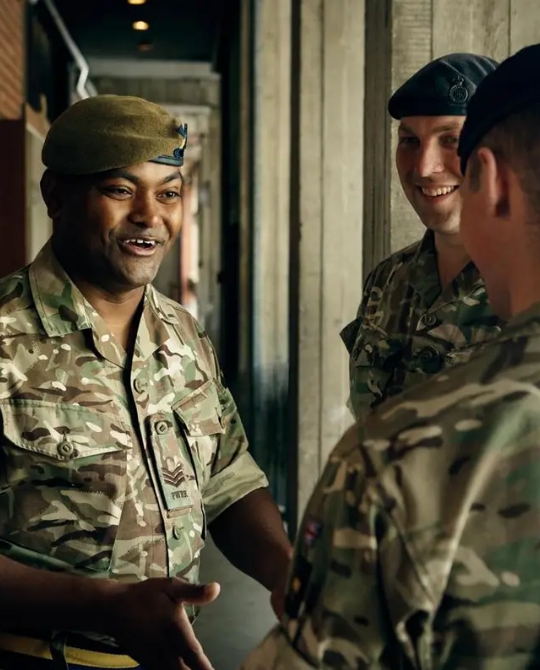
Blondel Cluff CBE
Blondel Cluff is a solicitor of over 37 years standing and a Fellow of Kings College, London where she was a member of the college council for several years, focusing on institutional change, governance and investment. Blondel has held various public appointments for over twenty years, addressing communities, education, health and heritage. She has recently retired as a diplomat, having represented the British Overseas Territory of Anguilla, supporting the territory through Hurricane Irma, constitutional reform and in its preparations for Brexit as a border nation of the EU.
The daughter of Windrushers from Anguilla, Blondel is CEO of the West India Committee. This is a UK registered charity and Royal Charter institution that is custodian of a UNESCO inscribed library and collection on the Caribbean and a Consulting NGO of UNESCO on small island developing nations and heritage. She is also Chair of the National Lottery Heritage Fund, London and South Committee and a member of the Royal Mint Advisory Committee. An author of various works on the Caribbean, Blondel regularly lectures on heritage. In 2018 she received a CBE for services to numismatic design and for her work with the individuals from a Caribbean background in the UK and abroad. Blondel is a co-opted member of the Commission on Race and Ethnic Disparities and is a member of the Windrush Cross Government Working Group.

I.Stephanie Boyce
I.Stephanie Boyce is a British solicitor. In March 2021, she became the 177th President of the Law Society of England and Wales – the sixth female President, the first black President and the first President of colour. Boyce is of Saint Vincent and Bajan descent, with her parents having moved to the UK as teenagers. She was born in Aylesbury where she was brought up in a single-parent household on a council estate. After studying law at London Guildhall University, she was admitted as a solicitor in 2002. Boyce is also a Council member representing the Women Lawyers Division.
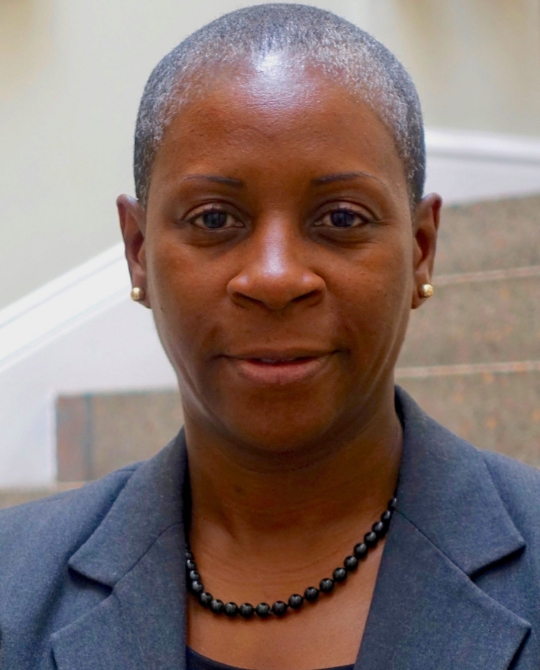
Dr Martin Griffith
Dr Martin Griffith is a consultant vascular, endovascular and trauma surgeon at Barts Health NHS Trust and National Clinical Director for Violence Reduction for NHS England. He was born in Southeast London to Jamaican parents. He is a leader in a rapidly growing area of medicine; treating victims of knife crime in London and is passionate about reducing violence in young people. In 2014, he set up the UK’s first hospital ward-based violence reduction service, at Barts Health. The service works with victims injured through knife crime while they are still being treated in hospital and works to unravel the complex social reasons behind knife crime, as well as offering holistic support to prevent further harm.
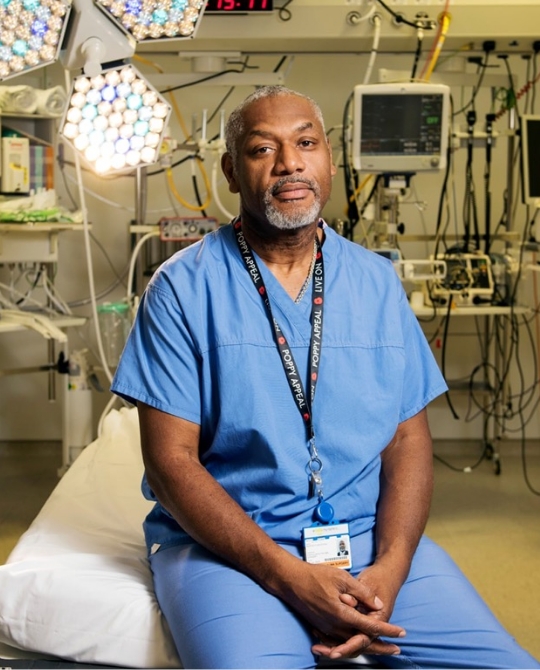
Bernard Alexander Montgomery Grant
Bernard Alexander Montgomery Grant was born on 17 February 1944 in British Guiana, now Guyana. When he moved to England to join his family, he studied engineering at Heriot-Watt University, leaving in 1969 in protest against discrimination against black students. Grant was elected as a Tottenham Councillor in 1978 and within a year was Deputy Leader of the Council. In 1985, he became the leader of Haringey Council, the first ever black person to hold such a position in Europe. He pioneered a number of equalities policies to eradicate all forms of discrimination. After the 1987 General Election, Grant was one of the first three black MPs in the Government and was outspoken in the cause of eliminating racism both in Britain and the world. He died in 2000 and his funeral at Alexandra Palace was attended by 5000 people from all sectors of society.

Dame Pat McGrath
Dame Pat McGrath is regularly described as the world’s most influential make-up artist. She was awarded a Damehood in the Queen’s New Year 2022 honours list, becoming the first makeup artist ever to do so. Throughout her career spanning over three decades in the beauty industry, she has worked with numerous global cosmetic brands, developed countless runway shows and created breakthrough advertising campaigns and editorial spreads. McGrath was born in Northampton in 1970 to her mother Jean McGrath, a first-generation Jamaican immigrant. She has cited her mother as the inspiration for her career and inspiring her passion for beauty. In 2015, she launched her own make-up brand Pat McGrath Labs, which has seen tremendous success and is known for catering to a large array of skin tones.
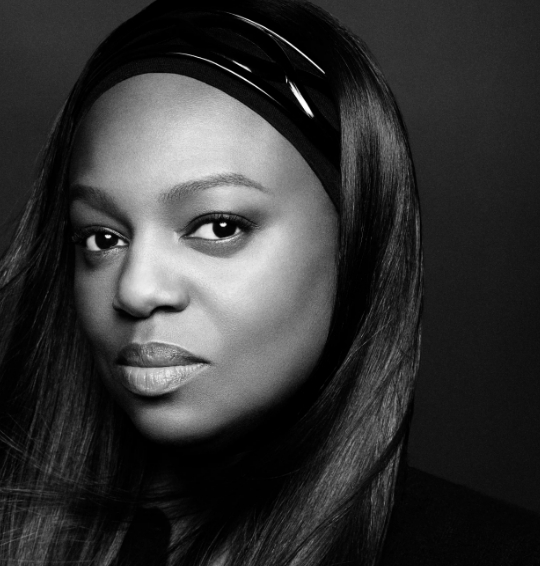
Baron Learie Constantine
Baron Learie Constantine was a West Indian cricketer, lawyer and politician who served as Trinidad and Tobago’s High Commissioner to the United Kingdom and became the UK’s first black peer. Constantine was born in Trinidad in 1901 and was first selected to represent his country at cricket in 1921. In 1929, he moved to England to play for Nelson in the Lancashire League. Throughout his career, Constantine was a strong voice for racial equality in Britain and during the Second World War he worked for the Ministry of Labour looking after the welfare of West Indian immigrant workers. In 1961, Constantine became the High Commissioner of Trinidad and Tobago and played a significant role in securing the country’s independence a year later. Constantine was made a life peer in 1969 and was the first black person to sit in the House of Lords. He died in his London home on 1 July 1971 and a memorial service for him was held in Westminster Abbey.

Baroness Valerie Amos, LG, CH, PC
Baroness Valerie Amos of Brondesbury was appointed a Labour life peer in 1997 and was the first black woman to serve as a Minister in the British Cabinet and in the House of Lords. Amos was born in British Guiana, now Guyana, in 1954 and moved to the UK with her family in 1963. Across her career she has held a number of high-profile positions. Amos was an adviser to the Mandela Government on leadership and change management issues and was Chief Executive of the Equal Opportunities Commission between 1989 and 1994. Amos has also held high office as Parliamentary Under-Secretary of State at the Foreign and Commonwealth Office between 2001 and 2003 and held the office of Secretary of State for International Development in 2003. After a further period in the Lords as spokesperson for the Northern Ireland Office, Amos became Leader of the House of Lords and Lord President of the Council between 2003 and 2007. Amos has additionally served as a Trustee for Voluntary Service Overseas, the Windsor Leadership Trust, Project Hope and the Institute for Public Policy Research.

Sonia Boyce OBE, RA
Sonia Boyce is a British Afro-Caribbean artist who lives and works in London. She studied at Stourbridge College, West Midlands. Boyce’s early work addressed issues of race and gender in the media and in day-to-day life. She expressed these themes through large pastel drawings and photographic collages. She is represented in the permanent collections of Arts Council England and Tate Modern, London. Boyce became a Royal Academician in 2016 and is currently Professor of Fine Arts at Middlesex University, London and Professor of Black Art and Design at University of the Arts London. In 2022 Boyce won the Venice Biennale’s top Golden Lion prize with her work Feeling Her Way.

Sir Steve McQueen CBE
Sir Steve McQueen is a director, screenwriter and artist. He was born in London to a Grenadian mother and Trinidadian father. He is best known for his films ‘Hunger’ and ‘12 Years a Slave’, which won the Academy Award for best picture, the first Black filmmaker to do so. Across his varied career, McQueen has received numerous awards for his art exhibitions and film work. In 1999, he won the Turner Prize for his original and uncompromising approach to film installation and his innovative presentation of work in other media. He has also worked as an official war artist and represented Britain at the Venice Biennale in 2009. In 2014, Time magazine included McQueen in its annual Time 100 list of the “most influential people in the world” and in 2016, he was granted the British Film Institute‘s highest honour, the BFI Fellowship. McQueen was knighted in the 2020 New Year Honours, for services to film.

Rudolph Walker CBE
Rudolph Walker is best known as Patrick Trueman in BBC’s long running soap EastEnders. Walker began acting at the age of eight and left his birthplace Trinidad to move to the UK in 1960. By the 1970s, he was well known as one of the first Black actors regularly seen on television screens. Since 2001, Walker has played much-loved Patrick Trueman in EastEnders and his two-decade long role in the soap has earned him national fame. In 2018, he was awarded the Outstanding Achievement Award at the British Soap Awards. Walker has also set up The Rudolph Walker Foundation, which helps disadvantaged youth to get a career in the arts.

Carmen Munroe OBE
Carmen Munroe is a British actress who has played an instrumental role in the development of black British theatre and representation on television. She was born in British Guiana in 1932 and moved to Britain in 1951. Munroe first appeared on the West End stage in 1962 and has appeared in numerous plays and television series since. In 1992, Munroe was a co-founder of Talawa, the UK’s leading black theatre company and in 2007 was awarded an OBE for her services to drama.

Dame Jessica Ennis-Hill DBE
Dame Jessica Ennis-Hill is a retired track and field athlete of Jamaican descent. She began her sporting journey at 13 and progressed through junior and youth competitions with great success. Ennis-Hill took part in the World Youth Games, World Junior Championships, Commonwealth Youth Games and European Athletics Junior Championships, winning medals on an international stage before she’d turned 18. Injury denied her the chance to compete at Beijing 2008, but she became the World and European champion in the following two years before her moment in the spotlight at London 2012. On the famous ‘Super Saturday’ evening in the Olympic Stadium, Ennis-Hill joined Mo Farah and Greg Rutherford on the top step of the podium to end the most memorable of days for Team GB. After taking a break from the sport for the birth of her son Reggie, Ennis-Hill returned to win heptathlon gold at the 2015 World Championships in Beijing before saying goodbye to a glittering career with silver at Rio 2016. More than 10 years after her first senior appearance, Jessica closed the curtain on her career in athletics and was offered a Damehood shortly after her retirement in 2016.

John Barnes MBE
John Barnes is a former professional football player and manager. He was born in Jamaica to a Jamaican mother and Trinidadian father before moving to London aged 12. During his stellar career he played for England 79 times, scoring 12 goals. He was a member of the Liverpool team that won the league title in 1988 and 1990, the FA Cup in 1989 and 1992, and the League Cup in 1995. He was the first black player to win the Football Writers’ Association Player of the Year award in 1988; he also won the prestigious Professional Footballers’ Association (PFA) Footballer of the Year award that same year. He retired in 1999 and moved into football management.
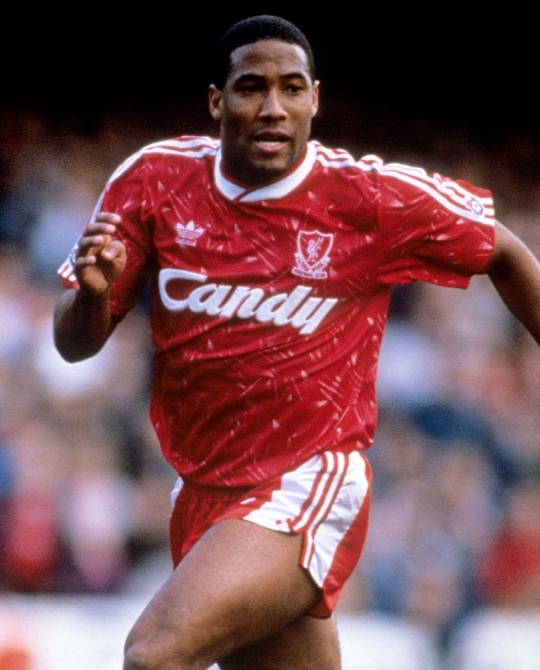
Marcus Rashford MBE
Marcus Rashford is a professional footballer for Manchester United and the England National Team. He was born in Manchester of Kittitian descent and has played for his club since the age of 7. He scored on his England debut in May 2016, becoming the youngest English player to score in his first senior international match. Rashford is also a campaigner against racism, homelessness and child hunger and has used his platform to be a political activist and philanthropist to drive societal change. For his efforts, he has received widespread praise, and has been recognised for his efforts from organisations both in and outside of sport. Rashford was the subject of a mural painted by street artist Akse in Withington.

Sir Geoff Palmer OBE
Sir Geoff Palmer is Professor Emeritus in the School of Life Sciences at Heriot-Watt University in Edinburgh and a human rights activist. Palmer was born in Jamaica and joined his mother in London when he was 14. Despite low expectations from his teachers for his educational attainment, he went onto achieve Six O-Levels and two A-levels before moving into higher education. He completed his PhD thesis in 1967. Palmer discovered the barley abrasion process whilst a researcher at the Brewing Foundation and in 1998 became the first European to be honoured with the American Society of Brewing Chemists Award of Distinction. Alongside his academic work, Palmer is also a prominent human rights activist and is involved in a considerable amount of charity work in the community.

Visit these pages to learn more about the Windrush story and the lives of those who travelled from the Caribbean to Britain.
The National Archives
The National Archives teaching resource on Caribbean migration for KS3 and KS4.

Museum of London
A curated selection of content from the Museum of London that explores the African-Caribbean community in London.
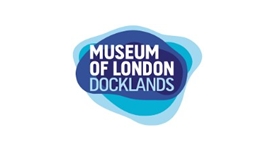
English Heritage
The history and impact of the Windrush Generation from English Heritage

British Library
‘Windrush Stories’ from the British Library invites visitors to consider a longer, more complicated and ongoing relationship between Britain and the Caribbean.

Black Cultural Archives
The Black Cultural Archives is the UK’s only heritage centre dedicated to preserving Black British History.

Goldsmiths University
Goldsmiths University have recreated 1027 individual landing cards representing each passenger who arrived on the MV Empire Windrush.

Liverpool’s International Slavery Museum
Liverpool’s International Slavery Museum untold stories of enslaved people and learn about historical and contemporary slavery.

Legacies of British Slavery
The Centre for the Study of the Legacies of British Slavery has been established at UCL to trace the impact of slave-ownership on the formation of modern Britain.

The London Transport Museum
Visit The London Transport Museum to learn more about members of the Windrush Generation who have worked in London’s transport network.
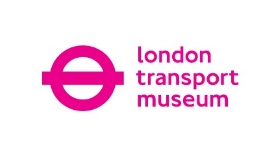
Funding and donation
The National Windrush Monument has been funded by the Department for Levelling Up, Housing and Communities.

The site was generously donated by Network Rail
